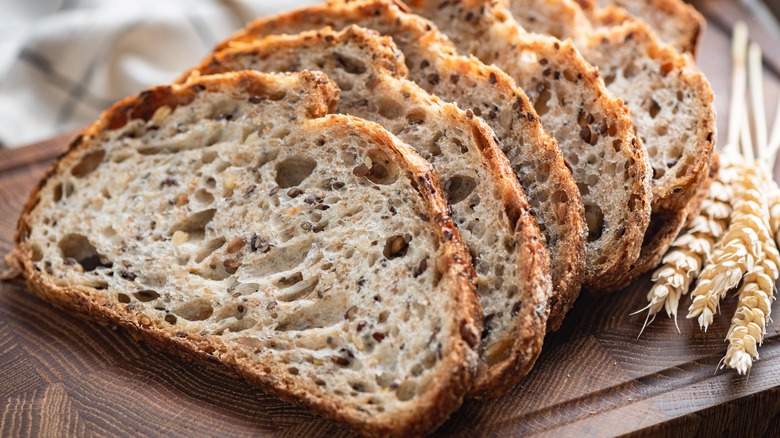Is Sourdough Bread Gluten-Free?
It's the age of gut health, and we're just living in it. People are more aware than ever of what they're putting into their bodies — whether it's gluten-free, low-FODMAP, keto, paleo, or probiotics. Everyone wants to avoid the uncomfortable side effects that can accompany celiac disease or IBS, and if you have any kind of wheat or gluten intolerance, you've probably been desperately searching for bread-like substances that won't fill you with regret later.
So you'll probably be pretty happy to know that a lot of people with gluten intolerances find that they are not allergic to sourdough bread and can enjoy it in moderate quantities. So, does this mean that sourdough bread is gluten-free? Surprisingly, the answer is no — those with celiac disease should still avoid it. Sourdough does contain gluten, but it is a low-gluten bread option, and the way that it is made allows for a lot of the gas-producing components (like fructans) in the bread to effectively be pre-digested, so they cause you less trouble.
Why sourdough is low in gluten
Sourdough is made from wheat flour, and all wheat flour contains gluten, a type of protein found naturally in wheat and many other grains. However, sourdough, like baguettes and rye bread, requires a long fermentation process before it is ready to bake. It is made from a sourdough starter that contains bacteria and wild yeast (instead of added baker's yeast), which interact with the dough over hours or even days to break down the gluten in the wheat flour.
This means that the longer your sourdough is fermented, the less gluten it has. Those with gluten intolerances may enjoy baking their own sourdough, as they can extend the fermentation process to their personal needs and preferences. It is this fermentation process that also gives sourdough its tangy flavor, which comes from the lactic acid produced by the starter.
White bread contains approximately 124,000 parts per million of gluten while sourdough can contain as little as 84 ppm. However, it is important to note that this is still enough to trigger an auto-immune reaction in those with celiac disease. Only individuals with milder gluten intolerances should experiment with their ability to digest sourdough bread.
Other benefits of sourdough
In addition to being lower in gluten than other styles of bread, sourdough has a lot of other things going on that may make it easier for you to digest. Like other fun, funky fermented foods like kimchi, kefir, and kombucha, sourdough has some probiotic benefits, which may make it easier for you to absorb vital nutrients.
The fermentation process also breaks down fructan, a carbohydrate that is also found in high levels in bread. Fructans can also negatively impact many people with digestive issues, so bread that contains them at lower levels is another win for those with digestion troubles.
Another casualty of the fermentation process is phytic acid, which can make you gassy. So, to sum up, sourdough bread has less gluten, fewer fructans, and lower levels of phytic acid, making it easier to digest than other wheat breads. It's also a probiotic powerhouse. So while it isn't safe for everyone, it might be the saving grace for someone with mild to middling tummy issues who just wants to enjoy a delicious sandwich once in a while.



